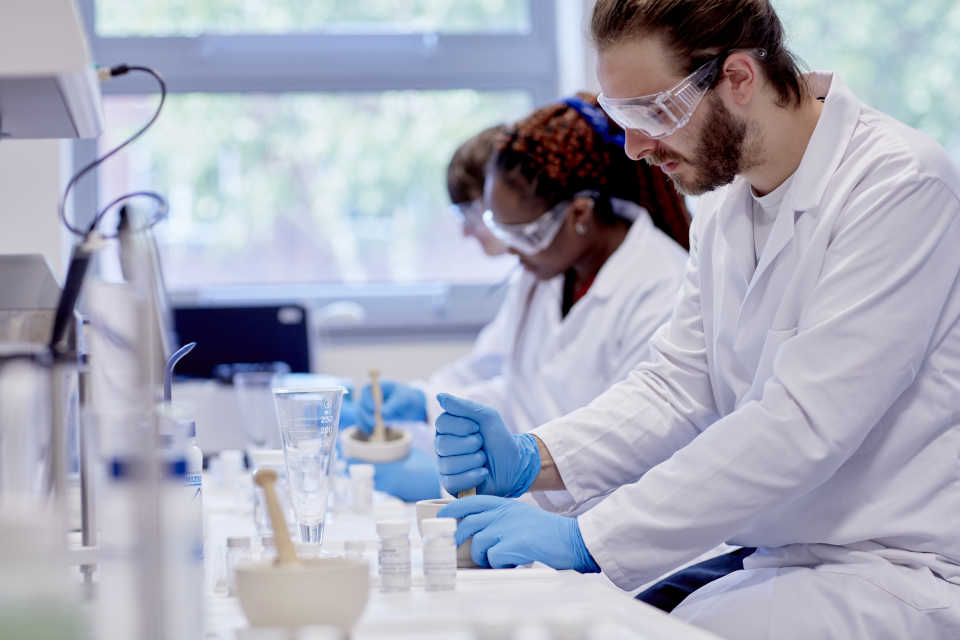Year of entry
- 2026
UCAS code
- C110
Duration of study
- 3 years or 4 years with international or placement year
Bioengineering (Regenerative Medicine) - BSc (Hons)
Course summary
Imagine being at the forefront of medical innovation, where you can help the human body heal and rebuild itself. Our Bioengineering (Regenerative Medicine) BSc combines cutting-edge science with real-world problem-solving. Working alongside our experts with access to state of the art laboratories, you will gain the transdisciplinary bioengineering know-how and practical skills to work on research, discovery and production of regenerative medicines.
Why study Bioengineering (Regenerative Medicine) at Keele University?
Accreditation and professional recognition

This course is accredited by the Royal Society of Biology for the purpose of meeting in part the academic and experience requirement for the Membership and Chartered Biologist (CBiol).
This programme has been accredited by the Royal Society of Biology following an independent and rigorous assessment. Accredited degree programmes contain a solid academic foundation in biological knowledge and key skills, and prepare graduates to address the needs of employers. The accreditation criteria require evidence that graduates from accredited programmes meet defined sets of learning outcomes, including subject knowledge, technical ability and transferable skills.
Engage with experts
Our research-driven Bioengineering (Regenerative Medicine) BSc brings together experts in bioengineering, pharmacy, materials science, and medicine. The faculty involved in the programme conduct cutting-edge, interdisciplinary research in the field of bioengineering (regenerative medicine), with their work regularly published in top-tier international scientific journals. Many of our staff members also serve on prestigious national and international committees, underscoring the high level of recognition for their contributions to the field.
Double Gold in the Teaching Excellence Framework
Keele is one of only 15 broad-based universities in England - out of over 100 - to have been awarded Gold in both the 2017 and 2023 Teaching Excellence Framework (TEF) exercises, demonstrating our consistent teaching excellence.

Additional opportunities
There are a range of additional opportunities for this course.
Please note that undertaking one may impact the availability of another.
Gain experience in industry
In an increasingly competitive job market, employers are seeking to recruit employees who have high-level knowledge, skills and an understanding of the workplace. In between year two and three of your studies, there is the opportunity to undertake a placement, gaining valuable practical experience. This will enable you to apply the skills and theories you have learnt to real situations in the industrial workplace and enhance your employability. Throughout your placement you will be supported by an academic advisor and a placements and project manager, who is based in the School of Life Sciences.
If you don't think you can commit to a full year on placement, our Flexible Work Placement module has built-in flexibility on when and how you complete your placement, enabling you to balance your time in industry around existing demands.
We also offer work placements based in schools and colleges, specifically for students interested in entering the teaching profession.
International year
During your studies you will have the opportunity to spend a year studying abroad. This exciting opportunity enables you to understand your field from different cultural perspectives and to establish international networks. It also shows you have the personal attributes to embrace new experiences which can enhance your employability. We offer exchange opportunities with a wide variety of partner institutions.
You can find more information here.
Entry requirements
These are the typical entry requirements for this course for a range of UK and international qualifications. If your qualifications aren't listed, please contact us to check if we can accept them. If you don't think you'll meet the stated requirements, you may be able to access this course via a Foundation Year.
Typical offer
Please ensure you read the full entry requirements by selecting your qualifications from the menu below. This will include any subject specific, GCSE/Level 2 Maths, and/or English language requirements.
Please select your qualification from the drop-down list below for the full entry requirement information
A Level
BBB in three A levels including B in Chemistry or Biology
Contextual Offer: BCC in three A levels including B in Chemistry or Biology
You will also need: 4 / C in GCSE Maths or Level 2 Functional Skills Maths, plus an English language qualification (see below)
BTEC Extended Diploma / National Extended Diploma
DDM in any of the following BTEC Extended Diplomas / National Extended Diplomas:
Applied Science
Contextual Offer: DMM in any of the following BTEC Extended Diplomas / National Extended Diplomas:
Applied Science
You will also need: 4 / C in GCSE Maths or Level 2 Functional Skills Maths, plus an English language qualification (see below)
BTEC National Diploma / Diploma
Distinction and Merit in any BTEC National Diploma / Diploma and B in Chemistry or Biology A Level, or Distinction and Merit in Applied Science BTEC National Diploma / Diploma and B in any A level
You will also need: 4 / C in GCSE Maths or Level 2 Functional Skills Maths, plus an English language qualification (see below)
BTEC National Extended Certificate / Subsidiary Diploma
Merit in any BTEC National Extended Certificate / Subsidiary Diploma and BB in two A Levels including B in Chemistry or Biology
You will also need: 4 / C in GCSE Maths or Level 2 Functional Skills Maths, plus an English language qualification (see below)
T Level
Merit in any of the following T levels:
Health
Healthcare Science
Science
You will also need: 4 / C in GCSE Maths or Level 2 Functional Skills Maths, plus an English language qualification (see below)
International Baccalaureate Diploma
555 in three Higher Levels including 5 in Chemistry or Biology, or 30 points including 5 in Higher Level Chemistry or Biology
Contextual Offer: 544 in three Higher Levels including 5 in Chemistry or Biology, or 28 points including 5 in Higher Level Chemistry or Biology
You will also need: 4 / C in GCSE Maths or Level 2 Functional Skills Maths, or 3 in IB Middle Years Maths, or 2 in IB Diploma Standard Level Maths (any), plus an English language qualification (see below)
International Baccalaureate Career-Related Programme
We encourage applications with the IBCP but recognise that your combination of qualifications may differ depending on where you are studying.
If you are taking a BTEC National Diploma / Diploma with one or more Higher Levels, your offer will be similar to our BTEC + A level offer (see 'BTEC National Diploma / Diploma') but with an HL requirement of 6 for A, 5 for B, or 4 for C.
For any other combination, please contact the University Admissions Team for advice.
Access to HE Diploma
122 UCAS points in an Access to HE Diploma with Chemistry or Biology related content, including Distinction in at least 30 Level 3 credits. Please contact the University Admissions Team for advice on whether your chosen course would qualify
You will also need: 4 / C in GCSE Maths or Level 2 Functional Skills Maths, plus an English language qualification (see below)
Welsh Baccalaureate / Bagloriaeth Cymru
The Advanced Skills Challenge Certificate is equivalent to one full A level at the same grade and can be included alongside 2 other A levels in a standard A level offer for this course (see A level). All subject specific requirements will still need to be met.
Scotland - Highers and Advanced Highers
BBBCC in five Highers including Chemistry or Biology Higher, or CC in two Advanced Highers and CC in two Highers including Chemistry Higher or Advanced Higher, or CCC in three Advanced Highers including Chemistry Advanced Higher
You will also need: C in National 5 Maths, or 4 / C in GCSE Maths or Level 2 Functional Skills Maths, plus an English language qualification (see below)
Extended Project Qualification (EPQ)
If you have B or higher in the EPQ and are studying A levels, BTEC, the International Baccalaureate Diploma, or an Access to HE Diploma, you will typically receive an alternative offer which will be lower than the standard offer. Please see 'Alternative and contextual offers' below.
Core Maths
If you have B or higher in Core Maths and are studying A levels, BTEC, the International Baccalaureate, or an Access to HE Diploma, you will typically receive an alternative offer which will be lower than the standard offer. Please see 'Alternative and contextual offers' below.
Ireland - Leaving Certificate
H3, H3, H4, H4, H4, H4 in the Irish Leaving Certificate including H4 in Chemistry, Physics and Chemistry (combined) or Biology
You will also need: O4 / H6 in Maths, plus an English language qualification (see below)
China - Gaokao
69% in the Gaokao including 69% in Chemistry or Biology.
You will also need: 60% in Senior Secondary School or Gaokao Maths, plus an English language qualification (see below).
India - Standard XII
Average of 70% from four subjects including 70% in Chemistry or Biology in the ICSE, CBSE or Western Bengal Standard XII, or average of 75% from four subjects including 75% in Chemistry or Biology in any other Standard XII
You will also need: 6 or C2 in Secondary School Examination Maths, or Pass in Standard XII Maths, plus an English language qualification (see below)
Germany - Abitur
2.2 overall average in the Abitur including 12 in Chemistry or Biology
You will also need: 10 in Maths in the Abitur, plus an English language qualification (see below)
France - Baccalaureate
13 in the French Baccalaureate / International Option Baccalaureate including 13 in Chemistry / Physics or Biology, or 12.5 in the Baccalauréat Français International including 12.5 in Chemistry / Physics or Biology.
You will also need: 10 in Maths in the Baccalaureate, plus an English language qualification (see below).
Hong Kong - Diploma
444 from two electives and one core subject in the HKDSE including 4 in Chemistry or Biology.
You will also need: 2 in HKDSE Maths (Core), plus an English language qualification (see below).
Spain - Bachillerato
Overall average of 7.4 in the Título de Bachillerato including 8 in Chemistry or Biology
You will also need: 5 in Graduado en Educación Secundaria (GES) Maths or 6 in Título de Bachiller Maths, plus an English language qualification (see below)
Italy - Diploma di Esame di Stato
80% in the Esame di Stato including 8 in Chemistry, Biology or Natural Science
You will also need: 5 in Maths in the Diploma, plus an English language qualification (see below)
Cyprus - Apolytirion
18 / 86% in the Apolytirion including 18 in Chemistry or Biology
You will also need: 14 in Maths in the Apolytirion, plus an English language qualification (see below)
Portugal
Overall average of 15.5 in a secondary certificate including 16 in Chemistry or Biology
You will also need: 10 in secondary certificate Maths, plus an English language qualification (see below)
Canada - Diploma
65% / BBBCC in five courses in the Grade 12 Diploma including 70% in Chemistry or Biology
You will also need: 50% in Grade 11 Maths, plus an English language qualification (see below)
Kenya - KCSE / Diploma
We do not accept the Kenya Certificate of Secondary Education for direct entry. However, you can apply to study an International Foundation Year at Keele University International College. On successful completion, you can progress to an undergraduate degree at Keele.
We may accept a two year Diploma. Please contact the University Admissions Team for advice.
Nigeria - Senior School Certificate / OND
We do not accept the Senior School Certificate (WAEC or NECO) for direct entry. However, you can apply to study an International Foundation Year at Keele University International College. On successful completion, you can progress to an undergraduate degree at Keele.
We may accept an Ordinary National Diploma with GPA of 2.5 or a Merit / Lower Credit. Please contact the University Admissions Team for advice.
USA - Advanced Placement
444 from three Advanced Placement subjects including 4 in Chemistry or Biology
You will also need: C in Grade 12 High School Diploma Maths, plus an English language qualification (see below)
Ghana
We do not accept the West African Senior School Certificate Examination for direct entry. However, you can apply to study an International Foundation Year at Keele University International College. On successful completion, you can progress to an undergraduate degree at Keele.
Sri Lanka - Advanced Level
BBB in three Advanced levels including B in Chemistry or Biology
You will also need: C in O-level Maths, plus an English language qualification (see below)
Malaysia - STPM
BBB in three Principal level subjects in the STPM including B in Chemistry or Biology
You will also need: C in SPM Maths, plus an English language qualification (see below)
Pakistan - Secondary School Certificate
We do not accept the Secondary School Certificate for direct entry. However, you can apply to study an International Foundation Year at Keele University International College. On successful completion, you can progress to an undergraduate degree at Keele.
Singapore - A Levels (H2)
BBB in three H2 levels including B in Chemistry or Biology
You will also need: C in O-level Maths, plus an English language qualification (see below)
European Baccalaureate
72% overall with 7 in Chemistry or Biology (4 period)
6 in European Baccalaureate Maths, plus an English language qualification (see below)
NCUK
Pass NCUK Foundation Year with BBB including B in Chemistry or Biology. Grade C in EAP English Language module
You will also need: 4 / C in GCSE Maths or international equivalent
Uganda - Advanced Certificate of Education
BBB in three Principal level subjects in the Advanced Certificate of Education including B in Chemistry or Biology
You will also need: 6 in UACE or UCE Maths, plus an English language qualification (see below)
South Africa - Matric (NSC and IEB)
66666 in five subjects including 6 in Physical Science or Life Science.
You will also need: 4 in NSC Maths, plus an English language qualification (see below).
Zimbabwe - ZIMSEC A level
BBB in three ZIMSEC A Level subjects including B in Chemistry or Biology.
You will also need: 4 / C in GCSE Maths or Level 2 Functional Skills Maths, plus an English language qualification (see below).
English language requirements
All our courses require an English language qualification or test. Most students meet this through a 4 or C in GCSE English. Please visit our English Language pages for details, including test information for international students. For students who require a test, this course requires a result from Group A.
Alternative and contextual offers
We're committed to ensuring equality of opportunity for applicants with the potential and motivation to succeed, regardless of background. We offer alternative offer schemes with clear eligibility criteria, including contextual offers, offers for those studying in the Keele region, and recognition of a range of additional qualifications.
General information
The entry grades outlined indicate the typical offer, along with any subject specific requirements. This is for general information only. Keele University reserves the right to vary conditions based upon a candidate's application. For international students, find out how we work with approved agents as part of our admissions process.
Social life, societies and sports
Find out moreAccommodation
Find out moreLocal area and travel
Find out moreBoost your employability
Find out more
"Studying at Keele University was an incredible experience. The teaching was impeccable, and I had so much unconditional support from across the university. The opportunities I was exposed to during my degree have had a huge impact on my career and personal development, such as being able to represent the university at a student summit in Japan, being able to conduct an original tropical research project in Malaysia and winning a national award on behalf of the university."

Foundation year
Our Foundation Year provides an excellent alternative route to Keele, offering preparation for your chosen degree with guaranteed entry onto your undergraduate course once you successfully complete.
This extra year of study can improve your academic skills, expand your subject knowledge, build your confidence, and provide a better understanding of higher education.
On our Foundation Year, you'll join our undergraduate community from the outset, with access to all the facilities and support you'd get as an undergraduate student at Keele.
The information in this Foundation Year section is for UK/Home applicants. Where an international Foundation Year is available, please see the 'Information for international students' tab.
The information within this page is for students wishing to start their studies in September. If you would like to start this course in January, please visit our January pages for further details.
Course content
Our Foundation Year allows you to develop your critical thinking, academic reading, writing, and communication study skills along with subject-specific knowledge and skills. Upon meeting the progression criteria and successfully completing our Foundation Year, you will automatically progress into your Keele undergraduate degree with the confidence that you have the skills, and knowledge needed to successfully complete your course.
This Foundation Year is a is a two semester programme which provides a tailored pre-degree programme of study to better prepare you for the BSc (Hons) Cell and Tissue Engineering course. For example, the Foundations of Human Biology in Health module consolidates any prior learning of human biology to build your knowledge of the functioning of a healthy human body. Starting with a look at basic cell biology, you will explore the main types of body tissues and structures and discuss how body systems work.
Course content has been developed in collaboration with degree teaching teams, so that by the time you begin Year 1, you will be ready to excel at your studies, as the majority of our Foundation Year students do.
On this Foundation Year, we will advance your knowledge of human biology and chemistry, giving you a solid grasp of body systems, science and lab work. You'll develop safe, professional laboratory skills and get to know the mathematical techniques and quantitative methods used across health science-related and social care programmes.
Throughout the programme, you will develop subject-specific and broad based skills that will be invaluable in your academic career and beyond. You can find out more about our Foundation Year, including information on learning, teaching and assessment methods and further opportunities available to you by visiting our homepage.
Course structure
The module details given below are indicative, they are intended to provide you with an idea of the range of subjects that are taught to our current students. The modules that will be available for you to study in future years are prone to change as we regularly review our teaching to ensure that it is up-to-date and informed by the latest research and teaching methods. The information presented is therefore not intended to be construed and/or relied upon as a definitive list of the modules available in any given year.
Semester one modules
| FYO-00390 | Foundations in Life Sciences | 30 credits |
| FYO-00392 | Foundations in Chemistry | 30 credits |
Semester two modules
| FYO-00199 | Advancing Life Sciences | 30 credits |
| FYO-00191 | Advancing Chemistry | 30 credits |
Entry requirements
The entry grades outlined in this section indicate the likely offer or range of offers which would be made to candidates along with any subject specific requirements. This is for general information only. Keele University reserves the right to vary offer conditions depending upon a candidate’s application. Read more about our undergraduate entry requirements.
- 56 UCAS points from at least 1 A level/level 3 qualification or equivalent, or
- Relevant work experience
AND
- GCSE English Language at grade 4 (C), or Level 2 Functional Skills
AND
- GCSE Mathematics at grade 4 (C) or above
How to apply
UCAS Applications
Visit UCAS for applications. You should apply for Bioengineering (Regenerative Medicine) with Foundation Year through UCAS at www.ucas.com.
UCAS code: C111
Direct entry students
If you already have your qualifications, are not expecting any further results and only wish to apply to Keele, please contact the Admissions Office directly.
The information in this Foundation Year section is for UK/Home applicants. Where an international Foundation Year is available, please see the 'Information for international students' tab.
We also offer a January start for some of our Foundation Year courses. Adopting a blended learning approach, the January start is particularly useful for students wishing to return to education following time out of studying, or who are seeking a flexible approach to their Foundation Year studies. Our January start is available across most of our Science, Humanities, Social Science, Health and Business courses.
Whilst still being a full-time course, our blended delivery model combines live teaching sessions - both online and on-campus - with self-directed study, enabling you to predominantly study at a time that suits your lifestyle. You will benefit from weekly online taught sessions which encourage you to engage with your teachers and peers.
In addition to online study there will be a series of full study days that you will be required to attend throughout each semester. These sessions may include lab-based activities, group work, review of course and assessment materials studied online. They will emphasise opportunities for you to deepen your knowledge and understanding of your chosen route.
Please refer to the September start tab for more information about the entry requirements and what you will study. The modules that you will take on a January start Foundation Year will be similar to those for the September start, but on a compressed timescale and tailored to a blended learning approach (with the majority of learning taking place online).
For more information, including fees, the UCAS code for this course, how to apply, and how you will be taught, please visit our January Start Foundation Year webpage.
Our International Foundation Year is delivered on campus through Keele University International College (KUIC). Find out more about the International Foundation Year options on the KUIC website.
Student life at Keele is vibrant, diverse, and packed with opportunities to make the most of your time at university.
We help students manage their money and ensure that they receive any funding for which they may be eligible.
Make yourself more employable after graduation by taking advantage of the whole host of additional opportunities.








